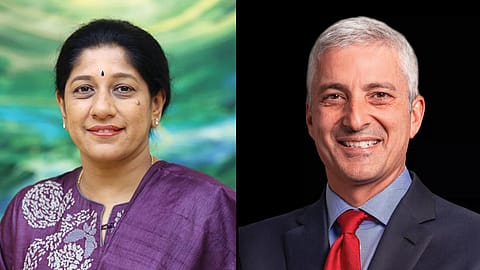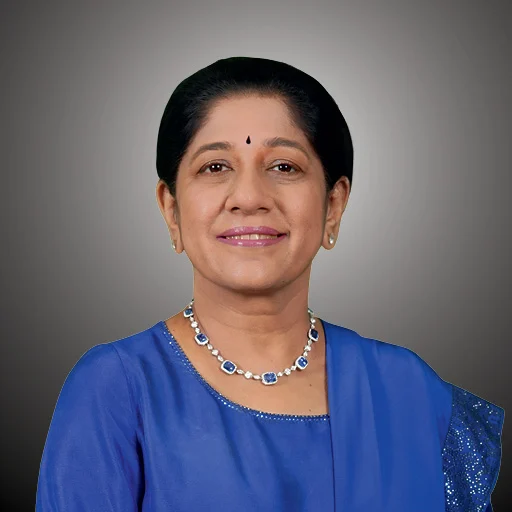How Mallika Srinivasan took on a Fortune 500 agri giant—and won
The landmark settlement between TAFE and AGCO reveals how a legacy industrialist quietly asserted control and reaffirmed her leadership chops.

For over half a century, Massey Ferguson’s red tractors have rumbled across India’s farmlands. But behind the brand’s Indian dominance lies a less visible but more formidable force: Mallika Srinivasan, the 65-year-old chairman and MD of Tractors and Farm Equipment Ltd (TAFE), who has just emerged from one of the most complex boardroom battles with a $12-billion agri-business titan.
As of July 1, a long-standing dispute between TAFE and the U.S.-based AGCO Corporation—the Fortune 500 maker of agricultural equipment and owner of the global Massey Ferguson brand—has finally ended. With it, a tangled web of commercial agreements, legal battles, and governance skirmishes also comes to a close.
AGCO will exit its 20.7% stake in TAFE for $260 million. TAFE will forgo board nomination rights, vote its AGCO shares in line with management, and abstain from activism. All commercial and legal agreements between the two firms—many stretching back decades—will wind down. TAFE retains exclusive rights to the Massey Ferguson brand in India, Nepal, and Bhutan.
For AGCO, it removes a major shareholding overhang and opens the door for long-awaited stock buybacks. In the Q1 2025 earnings call, AGCO chairman, president and CEO, Eric Hansotia, acknowledged that TAFE’s large shareholding had previously constrained stock buybacks. “We recognise that investors want us to do share buybacks—and so do we… That’s part of our discussions, and it’s certainly at the forefront,” Hansotia had said in the call. The CEO in the July 1 company statement has now stated: “We are pleased to have reached an amicable resolution.”
While it is now clear that TAFE cannot increase its stake in AGCO, what is not clear whether the restrictions from its prior agreement still apply—particularly the prohibition on selling shares to direct competitors or activist hedge funds, and the condition that any private sale must be limited to no more than 5% to a single entity or group. Institutional investors now dominate AGCO’s shareholder register. As of March 2025, T. Rowe Price (9.4%), Vanguard (8.9%), and BlackRock (8.1%) had become AGCO’s largest public shareholders. Should TAFE choose to exit via a public distribution, as per the previous agreement, AGCO is obligated to extend customary support, including filing registration statements, assisting with underwriters, and facilitating roadshows. Also, it’s not clear if TAFE, as per its earlier agreement, still enjoys the right to make a non-public offer to AGCO's chairman and board to acquire all or a part of the company or propose another similar strategic transaction that would result in a change of control of AGCO.
But the real story is not just the legal settlement, it’s about Srinivasan, who also happens to grace Fortune India’s Most Powerful Women listing for 2025.
The heir who didn’t hesitate
Recommended Stories
Srinivasan didn’t inherit TAFE on a silver platter—she earned her way up, starting at the company in 1986 after an MBA from Wharton. The eldest daughter of the late A. Sivasailam, former chairman of the over $2 billion Amalgamations Group, Srinivasan hails from one of India’s storied business families. Her grandfather founded the group in 1938, which today is a diversified industrial empire with 47 companies under its fold.
When her father passed away in January 2011, Srinivasan took over the reins of TAFE as chairperson, in addition to her CEO role. That same year, AGCO’s then-CEO Martin Richenhagen announced that Srinivasan would join AGCO’s board—finally fulfilling his public desire to bring in a capable woman to the otherwise all-male bastion. "Mallika helps me to understand India," Richenhagen once said. “She really knows what she’s talking about.” He also called her a “good negotiator”—an understatement that would prove prophetic.
Incidentally, AGCO’s relationship with TAFE was more by chance than design. In 1994, AGCO Corporation had bought out the Massey Ferguson Group Ltd., a unit of the Varity Corporation, for $328 million. But by then, the India, Nepal, and Bhutan rights to the Massey Ferguson brand had already been ceded to TAFE, which had taken over the Indian operations back in 1960. While AGCO had a 20.7% stake in TAFE it never had the upper hand. Despite being a significant shareholder, AGCO could never wrest control. "We have a very unusual situation in India because normally we would always control the business--with a majority stake…but Mallika is a good negotiator," Richenhagen had commended in a 2011 magazine piece. Srinivasan held the reins firmly, with TAFE continuing to own and operate the Massey Ferguson brand in India independently.
In fact, far from playing defence, Srinivasan quickly saw the potential of the strategic partnership and took it further. In 2012, TAFE acquired its first tranche of AGCO stock. By 2015, TAFE and Srinivasan had quietly built a 14% stake in AGCO, eventually rising to 16.3%—making it the single-largest strategic shareholder. These were not hostile as TAFE’s filings to the SEC categorised the purchases for “investment purposes.”
(INR CR)
Board Ally to Adversary
The turning point, however, came in November 2020, when Srinivasan signaled a dramatic shift. In a filing with the SEC—Amendment No. 13 to Schedule 13D—TAFE transitioned from a passive to an active investor. It called for major governance reforms at AGCO: separation of the chair and CEO roles, board refreshment, better diversity, and tighter oversight.
The development came about just before Richenhagen’s retirement in December 2020 and Hansotia’s elevation to the corner office in January 2021. Srinivasan supported Hansotia’s appointment, but not the concentration of power. For AGCO, it was a clear signal that Srinivasan wasn’t going to rubber-stamp decisions.
The friction intensified earlier this year when TAFE flagged issues with AGCO’s $2 billion PTx Trimble deal—specifically around capital allocation and a subsequent $354 million impairment. In fact, TAFE’s Schedule 13D filing further stated that AGCO has failed to effectively integrate and generate value from several high-cost acquisitions, resulting in significant write-offs. The filing cites the recent sale of the majority of AGCO’s grain & protein business, which incurred a cumulative loss of $670.6 million after being acquired for nearly $1.5 billion. TAFE noted that AGCO’s acquisition-driven approach has diverted attention from internal innovation and organic growth, with several key investments underperforming and critical projects falling short.
Even as the wrangle continued, , multiple “Letter Agreements” were inked over the years to keep the partnership intact. But each extension only postponed an inevitable break. By June 25, 2025—just days before the final resolution—the last extension was signed, pointing to how fragile things had become.
Beyond the Boardroom
This isn’t the first time Srinivasan has walked the tightrope between tradition and transformation. In 1982, she married into another industrial dynasty—Venu Srinivasan, now the chairman emeritus of TVS Motor Company. Her children, Lakshmi and Sudarshan, have also entered the family business, continuing a legacy across two influential business houses. But unlike many inheritors who play a passive role, Mallika has been at the forefront.
Though she is no longer on the board of AGCO after relinquishing her position, Srinivasan was one of the few Indian women to sit on a Fortune 500 board in the U.S., and her inclusion in AGCO’s leadership ranks in 2011 was hailed by diversity advocates in Georgia. “It sounds like an extremely smart business move,” Rona Wells, then executive director of the Board of Directors Network, had said.
While that’s history, the outcome is simply remarkable given how Srinivasan quietly achieved it all.
There were no media interviews, no public rebuttals, no emotionally charged letters. Srinivasan’s communication--as seen in the SEC filings--to the AGCO board was steely but understated. Her ability to assert influence without confrontation showed a rare blend of grit and grace.
With over a million Massey Ferguson tractors already at work across Indian farmlands and a $1.22 billion stake in AGCO, TAFE and AGCO appear poised for strong solo innings. While how the new-normal affects TAFE’s export arrangements with AGCO remains to be seen, Srinivasan, for now, has reaped a clear harvest.

